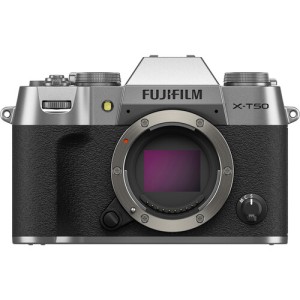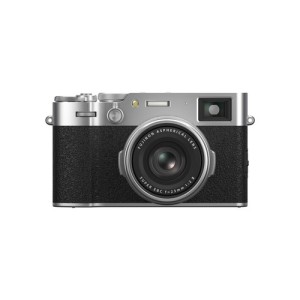FUJIFILM X-M5 Mirrorless Camera
Key Features
- 26.1MP APS-C X-Trans 4 CMOS Sensor
- X-Processor 5 Image Processor
- 6.2K/29.97 fps Video, 10-bit Internal
- 425-Point AF, AI-Based Subject Detection
- Up to 30 fps JPEG Shooting w/ 1.25x Crop
- 20 Film Simulation Recipes
- Creator-Friendly Video Modes
- 3.0" 1.04m-Dot Tilting Touchscreen LCD
- SD/SDHC/SDXC Card Slot
- Wi-Fi and Bluetooth Wireless Connections
FUJIFILM X-M5 Overview
Elevate What You Create. Elevate How You Create
For ambitious creators eager to ditch the smartphone and elevate their content, FUJIFILM offers the black/silver X-M5 Mirrorless Camera, whose slight footprint is complemented by a powerful, APS-C X-Trans 4 CMOS sensor, an audio and video-friendly interface, and an interchangeable lens mount accepting the entirety of FUJIFILM's X-mount lens family. Throw in 20 of their acclaimed film simulation recipes, their latest in AI-driven subject detection autofocus, the company's timeless, retro-inspired design, and the X-M5 is poised to transform the way you create.
Bigger Sensor, Better Image
The first X-M camera in more than a decade, the X-M5 boasts the same 26.1 MP X-Trans 4 CMOS sensor as its viral cousin, the X100V, and the same X-Processor 5 as the X100VI. More than 16 times the size of an average smartphone sensor, the X-Trans 4's superior light-gathering abilities mean richer colors, more detail, and better low-light performance. The sensor's design features a randomized pixel array that mimics the organic nature of the film, producing nuanced colors and transitions while reducing digital artifacts. The larger, APS-C sensor creates a shallower depth of field, unlocking deeper background blur and subject separation.
Optimized Audio, 6K Video
The X-M5 was designed to address the full spectrum of contemporary content creation, excelling in both audio and video capture. The camera has three built-in microphones and four sound capture modes—Surround, Front Priority, Back Priority, and Front & Back Priority—to optimize sound-gathering for specific situations. A 3.5mm microphone socket allows further control over the soundscape, while new in-camera algorithms enable both voice enhancement and environmental noise reduction










